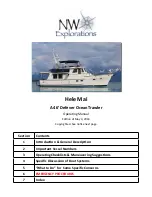
Fuel System
3-1
Section 3
C230
Fuel Systems
3.1 General
The fuel system of your Pursuit boat is
designed to meet the requirements of the
U.S. Coast Guard, Environmental Protection
Agency (EPA), National Marine Manufactur-
ers Association (NMMA), and American
Boat and Yacht Council (ABYC) in effect at
the time of manufacture.
Pursuit Boats has engineered an improved
fuel tank fill and vent system that will reduce
or eliminate fuel spillage when re-fuelling the
boat with a standard automatic shut-off fuel
fill nozzle provided by marinas and gas sta-
tions.
This is in accordance to EPA regulations.
While this system provides a clean consis-
tent refueling experience, it still requires the
operator’s attention and must not be
defeated by attempting to over-fill the tank
with fuel. This system will automatically pro-
vide the proper air space (approximately 5%
of total tank volume) in the fuel tank to
accommodate the expansion of fuel during
daily temperature cycles.
This new EPA compliant fuel system is engi-
neered to vent through a carbon canister
when the fuel cap is installed. This will
greatly reduce fuel vapors that escape to the
atmosphere and reduce the fuel odor that
was present on traditional systems. For that
reason, the fuel cap has been changed to
help the operator verify the cap is properly
closed.
Inspect the system frequently to ensure no
deterioration or loosening of connections
has occurred.
!
DANGER
FIRE/EXPLOSION HAZARD
Fuel and their vapors are highly explo-
sive when exposed to open flame or
spark, resulting in death or serious
injury.
•
Make sure no vapors are present
before turning on electrical equip-
ment or starting engines.
•
Make sure fuel is added to the fuel
tank only. DO NOT confuse other
deck fills with fuel fills.
•
DO NOT remove anti-siphon
valves from the system.
•
Turn off all electrical switches
before servicing the fuel system.
•
DO NOT drain any fuel in the bilge.
•
Check all fuel lines and fittings for
leaks before and after starting the
engines and after any fuel system
service.
•
Prime fuel system and check all fit-
tings for leaks before and after
starting the engines.
•
DO NOT block fuel vents.
•
DO NOT store fuel in any contain-
ers or compartments not desig-
nated for fuel storage.
!
NOTICE
Certain bulkhead areas are sealed fol-
lowing U.S. Coast Guard regulations
at the date of manufacture. Any modi-
fications must be in accordance with
the regulations.
Содержание C 230
Страница 12: ...Operator Notes 8 C230...
Страница 22: ...Operator Notes 2 6 C230...
Страница 38: ...6 2 Operator Notes C230...
Страница 44: ...8 2 Operator Notes C230...
Страница 76: ...12 6 Operator Notes C230...
Страница 82: ...Operator Notes A 6 C230...
Страница 84: ...Appendix B Maintenance Log Date Hours Dealer Service Repairs B 2 C230 Maintenance Log...
Страница 85: ...Maintenance Log B 3 Appendix B C230 Date Hours Dealer Service Repairs...
Страница 86: ...Appendix B Maintenance Log Date Hours Dealer Service Repairs B 4 C230...
Страница 87: ...Boating Accident Report C 1 Appendix C C230 Boating Accident Report...
Страница 88: ...C 2 Appendix C Boating Accident Report C230...
Страница 89: ...Float Plan D 1 Appendix D C230 Float Plan...
Страница 90: ...Operator Notes D 2 C230...
Страница 94: ...Operator Notes E 4 C230...
Страница 95: ...Schematics F 1 Appendix F C230 Schematics...
Страница 96: ...F 2 Appendix F Schematics C230 C 230...
Страница 97: ...Schematics F 3 Appendix F C230 C 230...
Страница 98: ...F 4 Appendix F Schematics C230 C 230...
Страница 99: ...Schematics F 5 Appendix F C230 C 230...
Страница 100: ...Operator Notes F 6 C230...
Страница 101: ......
Страница 102: ......
















































